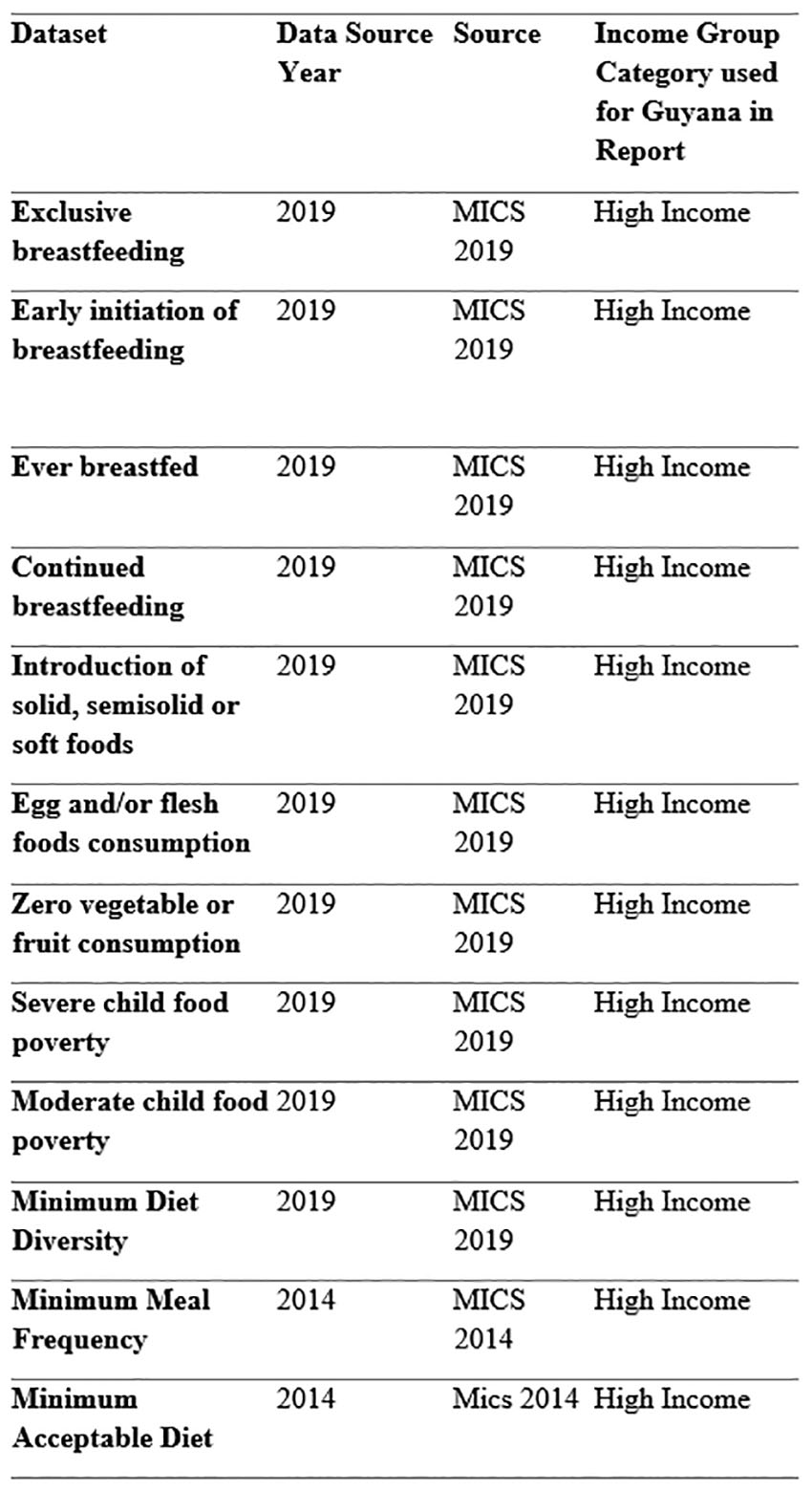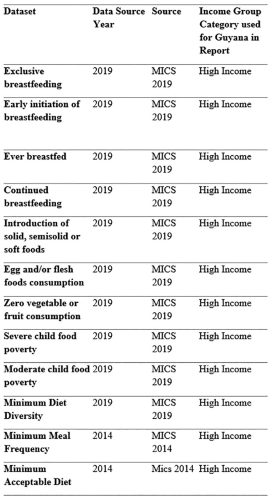-data outdated
The Government of Guyana yesterday said that a United Nations Children’s Fund (UNICEF) report on child food poverty used outdated data and made “misleading deductions”.
The Ministry of Parliamentary Affairs and Governance (MPAG) , in a release said that the “misleading deductions,” shown in the forms of graphs and charts, advance the view that Guyana has somehow seen an increase in child food poverty in 2024.
The UNICEF report said that Guyana is among 63 countries facing severe child food poverty. According to the report, some 20% of the country’s children are exposed to only two food groups daily while another 40% have 3 to 4 food groups and fall under the moderate child poverty category.
The MPAG release noted that the Report is dated June 2024, and therefore can be easily perceived as a reflection of the current state of affairs globally. However, it argued that much of what is stated in the report is not true for countries like Guyana; UNICEF utilised data from the Guyana 2019 and 2014 Multiple Indicator Cluster Survey (MICS) reports. These 2019 and 2014 figures were also being compared to data going back as far as 2000 to assume trends, and as a result, the findings of the report are regrettably inaccurate, it said.
The release noted that an assessment of all the datasets referenced in the report shows that all categories of data are derived from the UNICEF Global Database on Infant and Young Child Feeding. The overarching categories of data available in this database and their sources and dates with regards to Guyana are as follows:
This shows that Guyana is placed at disadvantage with 2014 and 2019 data while being considered high-income in 2024
Further, in noting that the report considers the most recent statistics to be from a five-year-old report (MICS 2019), or in some cases, a 10-year-old report (MICS 2014), the MPAG release cautioned that one must pay keen attention to the fact that as a result of the report being published and dated in 2024, Guyana is consistently listed as a ‘High-Income Country’ in all of the datasets (all available on the UN websites).
This, it contends, “is an undoubtedly unfair and flawed analysis,” as in 2019, Guyana was considered by the World Bank to be an upper middle-income country, and in 2014, long before the onset of oil revenues, Guyana was classified on the World Bank’s economic index as a lower-middle income country.
“This cannot be ignored as economic classifications in surveys are generally intended to aggregate and analyse data for groups of similar economies or similar countries i.e., data experts who manipulate the data to inform rankings in all types of statistical analyses generally use those economic classifications by grouping and analysing countries with similar income levels together.”
The MPAG said that the utilisation of dated statistics in tandem with an up-to-date income classification without adequate consideration for the significant economic shifts that have occurred over the past four years inherently places Guyana at a disadvantage.
MPAG said that the results then provoke the obvious question, “Why is Guyana rated so poorly if we have access to more resources than we did five years ago? And as far as the government is concerned, the answer is simple, “The report is still addressing perceptions of the situation in Guyana through the lens of datasets that UNICEF itself collected as much as ten years ago whilst incorrectly classifying Guyana at a status it did not have in those years. To err on the side of redundancy and for further clarity, we repeat – the data is alarmingly outdated for a 2024 report.”
Consideration of cultural and culinary diversity
Moving on from outdated data, the release highlighted the report’s lack of consideration for cultural nuances within the Guyanese context. “Guyana boasts a rich ethnic diversity of Guyanese Amerindians who are our indigenous peoples, and Guyanese of African, Indian, Chinese and Portuguese descent whose ancestors were all brought to the shores of Guyana under the cruel realities of slavery and indentureship.”
According to the release, a critical part of the Guyanese people’s resilience has been their bond to their ancestral identities, including through the preservation of culinary cultures and dietary traditions. Such culinary diversity, it explained, is upkept through the informal preservation of culture in many communities, from the hinterland regions to the rural and urban areas, and is an important part of the Guyanese identity from as early as birth. Parents pay keen attention to ensuring that their babies and children are nourished with the same trusted foods that their parents, grandparents and prior generations used.
It endeavoured to point out that while this is by no means a justification or an excuse in the interest of supporting situations of undernutrition and malnutrition, it must be appreciated that the diets of people across the country are diverse, but that importantly, different does not always mean bad.
The point was made that the indicators and metrics used to measure nutrition are applied across the board and not adapted to consider the social-cultural variances across countries. As such, it does not take into consideration the nuances of diets in countries such as Guyana, where, for example, Guyanese Amerindians may have diets comprising primarily of cassava, fish, fruits and vegetables, which are equally nutritious forms of various critical nutrients.
Further, UNICEF’s collection of data takes into consideration anthropometric characteristics which invariably discriminate against genetic predispositions of height, weight, etc. For example, the average height among Guyanese Amerindians may be below the average height of Europeans, however, this is by no means an indicator of stunting, although it is often misconstrued by such reports to reflect such.
Availability of Data outside of the UN system
UNICEF, like many other UN agencies, the government said, relies extensively on data that they have collected themselves and this practice “intentionally disregards” the availability of more up-to-date administrative data in national agencies. For example, the Ministry of Health through its various programmes, including its Epidemiological Unit, has been able to provide current data in the compilation of various reports at the local level. Regrettably, such administrative data is not considered in the compilation of reports such as the 2014 and 2019 Multiple Indictor Cluster Surveys (MICS), as these rely wholly on data that UNICEF itself collects through surveys that they conduct locally.
“In the absence of expansive national data in small developing countries, due to numerous resource constraints, such administrative data is valuable and could be validated by UNICEF and absorbed into their studies and analyses to ensure that the results are a timelier and accurate reflection of the current situations in those countries, like Guyana.”
As such, the government put forward the case that national statistics agencies such as the Bureau of Statistics in Guyana are the ones who provide assistance to the UN to conduct their surveys. However, these project-driven surveys with a primary goal to provide international organisations with data are often deficient in funding, staffing, and the knowledge necessary for collecting the relevant and context specific information.
Child nutrition remains paramount
The release acknowledged that access to nutritious meals is paramount and therefore cannot be discredited, hence the reason why the Government of Guyana has been working extensively to invest revenues generated from the oil economy over the past four years into diversifying and expanding agriculture across the country. It is also constructing new and expanded health facilities across all regions, training Guyanese in diverse fields such as Food, Nutrition, and Dietetic Aid through free GOAL scholarships, introducing and expanding hot meals and school feeding programmes, distributing across the board “Because We Care” cash grants for all children enrolled in public and private schools annually, and expanding road and bridge networks to ensure equitable access to goods (including produce, agricultural equipment and supplies, etc.) and services for all.
“Many countries like Guyana in the global south are now striving to improve livelihoods by enshrining equal fundamental rights, ensuring equal opportunities and sustaining equitable access to goods and services, while also struggling to improve data collection. Consistent measures to enhance development while simultaneously reconstructing economies affords due credit to such countries for the small steps made in the right direction.”
However, the release posited that such efforts have gone unnoticed in this report, especially in the case of Guyana, which is only mentioned in the labelling of about three graphs in the report. Guyana, like most other small developing countries, it pointed out, was not afforded a single line or a reference to any other report which may highlight best practices and opportunities for development.
MPAG urged Guyanese to engage in more meaningful analyses of reports that are published about their country by agencies outside of its borders. Especially regarding surveys and their findings, it advised that it is “critical” to always review which datasets are used and how the data was collected.







